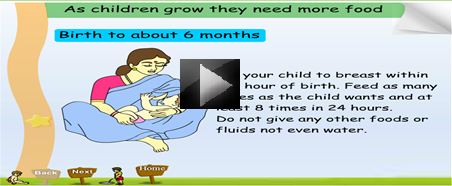Developmental milestones in children
Developmental milestones in children
To view the Interactive content on Child Growth, Click on below image
A child's growth is a complex and continuous process. Children should be able to do certain things at certain ages. These are called developmental milestones. As a parent, it is important to realize that no two children develop at the same rate. It is therefore futile to worry that the child next door can do this and that, while ones own child cannot. The child should be observed for some time, at the ages noted for different activities.
If at the end of a few months s/he is still not doing a particular activity, a paediatrician must be consulted. This takes into account the fact that the child may be acting differently because the child is sick or upset. Sometimes the child may develop more slowly in certain areas than other children of the same age while his/her other activities may be ahead of other children. Forcing a child to learn to walk when the child is not ready does not help.
Rapid screening for developmental delay
- 2 months - Smiling when "talked to"
- 3 months - Recognizes mother
- 4 months - holding neck, rolling over
- 5 months - Reaches out for an object and holds it in his / her hand
- 6 months - Making sounds like 'ma', 'ba' etc.,
- 8 months - sitting without support
- 9 months - Crawling
- 12 months - standing
- 13 months - Walking with support
- 24 months - Walks upstairs, Makes simple sentences
- 36 months - Riding a tricycle
- 48 months - Throwing ball over head, walking down stairs with one foot to a step
- 72 months - Copying complex figures
Developmental milestones in children
Birth to 6 weeks
- Baby lies on the back with head turned to one side
- Sudden noise startles him/her making the body stiff
- The fists are clenched
- The Baby may grasp an object touched to his/her palm crudely; this is the grasp reflex
6 to 12 weeks
- Learns to hold his/her head better
- Able to fix his/her eyes on objects
3 Months
- While lying on the back the baby moves each of his/her arms and legs equally well. Movements are not jerky or uncoordinated movements. The child makes gurgling sounds and other noises besides crying
- The baby recognizes the mother and responds to her voice
- The child's hands are frequently open
- When the child is held upright, the baby is able to support his/her head for more than a moment
6 Months
- The baby plays with his/her hands by touching them together
- The child turns his/her head to sounds that are made around him/her
- The baby can roll over from his/her stomach to his/her back or from his/her back to his/her stomach
- The baby may be able to sit briefly with support
- When the baby is held up, s/he is able to bear some weight on his/her legs
- When s/he is on his/her stomach, the baby can support his/her weight on outstretched hands
9 Months
- The baby is able to sit without support and without holding up his/her body with his/her hands
- The baby is able to crawl or creep on his/her hands and knees
12 Months
- The baby pulls up to stand
- The baby begins to say words like 'mama'
- The baby is able to walk holding on to furniture
18 Months
- The child can hold a glass without help and drink from it without spilling
- The baby can walk all the way without support across a large room without falling or wobbling
- The baby can say a couple of words
- The baby is able to feed himself / herself
2 Years
- The Baby can take off some clothes such as pajamas
- The Baby is able to run without falling
- The Baby takes interest in pictures in a picture book
- The Baby is able to say what he wants
- The Baby begins to repeat words others say
- The Baby is able to point to some parts of his body
3 Years
- The Baby is able to throw a ball overhand (not sidearm or underhand)
- The Baby can answer simple questions like "Are you a boy or a girl?"
- The Baby helps put things away
- The Baby can name at least one colour
4 Years
- The Baby is able to pedal a tricycle
- The Baby can name pictures in books or magazines
5 Years
- The Baby can button some of his clothing
- The Baby names at least three colours
- The Baby can walk down stairs alternating his feet
- The Baby can jump with his feet apart
Developmental delay in children
Developmental delay occurs when a child exhibits a significant delay in the acquisition of milestones or skills, in one or more domains of development (i.e., gross motor, fine motor, speech/language, cognitive, personal/social, or activities of daily living). A significant delay has been traditionally defined as discrepancy of 25 percent or more from the expected rate, or a discrepancy of 1.5 to 2 standard deviations from the norm.
Source:
Related resources
Last Modified : 8/18/2020
This topic provides information about Zero tillage...
This topic covers information related to Acute res...
This topic provides information about Causes, targ...
This topic provides information related to steps t...

